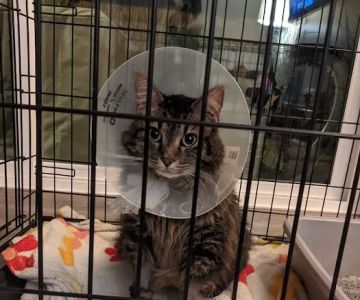How Preventative Care Can Significantly Extend Your Pet’s Life
As a pet owner, I’ve always wanted the best for my furry friends, from providing them with healthy food to ensuring they get plenty of playtime. But one thing that has really stood out in keeping my pets healthy and happy is the importance of preventative care. Just like humans, pets need regular check-ups, vaccinations, and proper nutrition to stay in optimal health. The role of preventative care in extending your pet’s life cannot be overstated. In this article, I’ll share my personal experience, the benefits of preventative care, and why it’s crucial for your pet’s long-term well-being.
1. What is Preventative Care for Pets?
Preventative care is the proactive approach to managing your pet's health. It's all about taking steps to avoid illness, detect health issues early, and ensure that your pet is living a long, healthy life. As pet owners, we often focus on caring for our pets when they’re sick, but preventative care is all about keeping them healthy in the first place. Just like humans go for regular check-ups to prevent diseases, our pets need the same level of attention.
Preventative care includes things like annual veterinary exams, vaccinations, dental care, parasite prevention, and maintaining a proper diet. The goal is to detect problems before they become serious, and provide the best care to ensure your pet stays as healthy as possible throughout their life. By prioritizing preventative care, you can significantly reduce the risk of developing costly and life-threatening conditions down the road.
2. The Role of Regular Vet Check-ups in Preventing Illness
When I first adopted my dog, Max, I made sure to take him to the vet for regular check-ups. At first, I didn’t realize how important these check-ups really were. During one of his early visits, the vet discovered that Max had a mild heart murmur that could have worsened over time. Thanks to the early detection, we were able to monitor the condition and provide treatment, preventing more serious health issues from developing later.
Regular vet visits are crucial for catching health issues early. During these visits, the vet will conduct a thorough physical exam, check your pet’s weight, look at their teeth and gums, and listen to their heart and lungs. If any concerns arise, your vet can recommend specific tests or treatments. These exams are key to ensuring your pet remains healthy and that any potential issues are addressed before they become bigger problems.
In addition to physical exams, regular vet visits allow you to stay on top of vaccinations and parasite prevention. Vaccines protect pets from common but serious diseases like rabies, parvovirus, and distemper, while parasite control helps keep fleas, ticks, and worms at bay. These preventive measures are an essential part of keeping your pet safe from harm.
3. The Importance of Diet and Nutrition in Preventative Care
Diet and nutrition play a huge role in your pet’s overall health and longevity. A healthy diet helps prevent a range of health issues, including obesity, heart disease, and joint problems. When I switched Max to a high-quality, balanced dog food, I noticed a significant improvement in his energy levels and coat condition. This is because the right food provides the necessary nutrients to maintain strong bones, muscles, and a healthy immune system.
Consulting with your veterinarian about the best diet for your pet is one of the most important steps in preventative care. Different life stages (puppy, adult, senior) require different nutritional needs. Additionally, certain breeds may have specific dietary requirements. Some pets may also have food allergies or sensitivities that need to be taken into account.
In addition to providing the right food, ensuring that your pet maintains a healthy weight is vital. Obesity can lead to a host of health problems, including diabetes, arthritis, and heart disease. A balanced diet combined with regular exercise can help keep your pet at a healthy weight and significantly extend their lifespan.
4. How Parasite Prevention and Dental Care Help Prevent Serious Health Issues
When it comes to preventative care, parasite prevention and dental health are two often overlooked but vital areas. For example, fleas and ticks can transmit dangerous diseases like Lyme disease and flea allergies. If left unchecked, parasites can lead to severe health problems. Regular use of flea and tick preventatives, as well as monthly heartworm treatments, can protect your pet from these parasites.
Dental care is another crucial aspect of preventative care. Like humans, pets are prone to dental issues such as plaque buildup, gum disease, and tooth decay. I learned this the hard way when Max developed a painful tooth abscess, which required surgery. Since then, I’ve made sure to brush his teeth regularly and take him for professional dental cleanings. By keeping your pet’s teeth clean, you prevent infections, discomfort, and potential organ damage from bacteria entering the bloodstream.
5. Preventative Care in Senior Pets: Special Considerations
As pets age, their health needs change. Just like humans, older pets are more susceptible to chronic conditions like arthritis, kidney disease, and diabetes. This is why preventative care becomes even more critical as they enter their senior years. Regular veterinary check-ups become even more important as we monitor for signs of aging-related health issues.
For my cat, Bella, the transition to her senior years was a bit challenging. She started slowing down, and her appetite diminished. Thanks to her regular vet visits, we caught her early signs of kidney disease, and with the right diet and medications, we were able to manage the condition. Without these regular check-ups, we might have missed it until it became a major issue.
Additionally, senior pets often benefit from joint supplements, weight management, and special diets to keep them comfortable and mobile. Regular blood tests and urine analysis help detect internal issues early, and your vet will guide you in keeping your senior pet as healthy as possible.
6. How Hidden Brook Veterinary Can Help with Preventative Care
If you’re looking for the best preventative care for your pet, I highly recommend visiting Hidden Brook Veterinary. They offer comprehensive wellness plans that include regular check-ups, vaccinations, dental care, and parasite prevention. Their team of experienced professionals can help you create a tailored health plan for your pet, ensuring they live a long, healthy, and happy life.
At Hidden Brook Veterinary, they understand the importance of preventative care and are committed to providing exceptional services to keep your pet in optimal health. Whether you need advice on nutrition, parasite control, or managing your pet’s senior health, their knowledgeable team is there to guide you every step of the way.
By investing in preventative care now, you’re giving your pet the best chance at a long, healthy life. Start with a visit to your veterinarian today, and you’ll be taking an important step toward ensuring your pet’s well-being for years to come.











